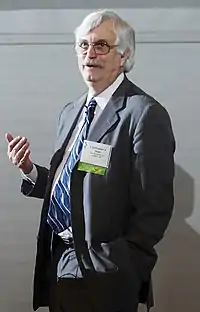Christopher Dede
Christopher 'Chris' Dede (born 1947), is an educational researcher and the Timothy E. Wirth Professor in Learning Technologies at the Harvard Graduate School of Education.[1] His expertise includes emerging technologies, policy and leadership in education.[2] He has been noted as one of the main contributors to the emergence of educational technology in the 2000s and 2010s[3] and has received awards for his research from the American Educational Research Association, the Association for Teacher Educators, and the Association for Educational Communications and Technology.[4]

Biography
Christopher Dede earned a B.S. in chemistry and English from the California Institute of Technology in 1969 and a doctorate in science education from the University of Massachusetts in 1972, where he became an assistant professor after graduation. In 1974, he moved to the University of Houston-Clear Lake, being promoted to full professor in 1981, before moving further to George Mason University in 1991. Since 2000, Dede has been the Timothy E. Wirth Professor in Learning Technologies at Harvard University's Graduate School of Education, where he chaired the Learning & Teaching department in 2001–04. Additionally, he has been a policy fellow at the National Institute of Education and a senior program director at the National Science Foundation as well as a visiting scientist at NASA's Johnson Space Center and at MIT's Computer Science Lab.[5]
Research
Christopher Dede's research interests include emerging technologies for learning and assessment in education,[6] the scaling up of technology use in education, educational policy, and leadership in educational innovation.[7] In his research, Dede has argued that immersion in a digital environment can enhance education by allowing multiple perspectives, situated learning and transfer through simulation of reality.[8] Together with Matt Dunleavy and Rebecca Mitchell, he has studied the potentials and pitfalls of the use of augmented reality in teaching and learning.[9]
Honors and awards
In 2011, Chris Dede was named a fellow of the American Educational Research Association.[10] He has received awards from the Society for Information Technology in Teacher Education (2010), the Association for Educational Communications and Technology (2011), the Association for Teacher Educators (2012) and the Center for Digital Education (2016).
References
- Faculty profile of Christopher Dede on the website of Harvard Graduate School of Education. Retrieved July 25th, 2019.
- Profile of Christopher Dede on the website of IGI Global. Retrieved July 25th, 2019.
- CoSN/EdScoop's list of 25 innovators and innovations that have changed education over the last 25 years. Retrieved from PremiereSpeakers.com on July 25th, 2019.
- List of awards on the faculty profile of Chris Dede on the website of HGSE. Retrieved July 25th, 2019.
- Curriculum vitae of Chris Dede on the website of HGSE. Retrieved July 25th, 2019.
- Dede, C. (1996). The Evolution of Distance Education: Emerging Technologies and Distributed Learning. American Journal of Distance Education, 10(2), pp. 4-36.
- Faculty profile of Chris Dede on the HGSE website. Retrieved July 25th, 2019.
- Dede, C. (2009). Immersive Interfaces for Engagement and Learning. Science, 323(5910), pp. 66-69.
- Dunleavy, M., Dede, C., Mitchell, R. (2009). Affordances and Limitations of Immersive Participatory Augmented Reality Simulations for Teaching and Learning. Journal of Science Education and Technology, 18(1), pp. 7-22.
- Curriculum vitae of Chris Dede on the website of HGSE. Retrieved July 25th, 2019.
Bibliography (selected)
- Dede, C., Honan, J.P., Peters, L.C. (2005, eds.). Scaling Up Success: Lessons Learned from Technology-Based Educational Improvement. San Francisco, CA: Jossey-Bass.
- Dede, C. (2006). Online Professional Development for Teachers: Emerging Models and Methods. Cambridge, MA: Harvard education Press.
- Dede, C., Richards, J. (2012, eds.). Digital Teaching Platforms: Customizing Classroom Learning for Each Student. New York: Teachers College Press.